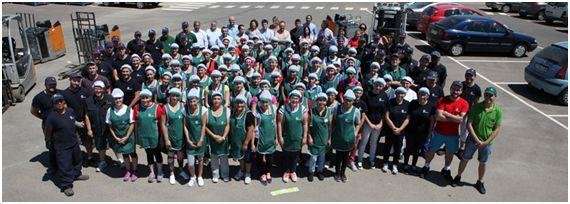Farmers and members of Camposeven SAT. Credit: UPM
Researchers from the group of GESPLAN at Universidad Politécnica de Madrid have applied the Working with People methodology to rethink sustainability, resilience and rural development in Europe.
Agricultural policy has to be designed from farmers' local knowledge. It should be based on the identity and dynamism of rural areas by applying integrated strategies and a multisectoral approach to promote diversification, entrepreneurship, innovation, and employment in rural areas. These are the main conclusions of RETHINK, a project funded by the European Commission with the participation of a team of researchers from Universidad Politécnica de Madrid (UPM).
The aim of RETHINK project was to rethink the links among rural modernization, resilience and rural development in a world of increasing demands and limited resources. A multidisciplinary consortium of 14 teams from 14 European countries was involved in this project.
Each team was responsible for a study case from its relationship between university and business considering a wide range of situations in order to study the case from diverse perspectives. The key questions included four main subjects: resilience in agriculture, prosperity in rural areas, governance and learning from farmers and other stakeholders.
The research group on Planning and Sustainable Management of Rural-Local Development (GESPLAN) at UPM worked with farmers from Camposeven, the Agrarian Society of Transformation (SAT) in the region of Murcia, created in 2007 and led by Adolfo García. Universidad Politécnica de Madrid collaborates with this organization through the Fundación Ingenio Chair.
According to GESPLAN researchers, "the European selection of Camposeven society was due to its innovative culture, pioneer of ecological and biodynamic products and its leadership of the food sector".
Researchers assessed the growing imbalances in prosperity and well-being of rural areas, their causes and potential solutions. They also analyzed how agricultural changes affect rural prosperity and whether there is a change of perspective from the efficiency point of view (production cost, productivity…) towards effectiveness (social goals, environmental goals, better quality of life).
The main conclusions of this project suggest a growing need to recognize the potential knowledge of local farmers and the successful experiences in rural areas, all this in order to provide innovative, inclusive and sustainable solutions for the current and future social challenges such as prosperity, food safety, climate change, sustainable management of resources, social inclusion and integration of migrants.
The main results of the project have been published in a Special Issue of the scientific Journal of Rural Studies. This study was also published in the Land Use Policy Journal, Energies Journal, and Agrociencia Journal.
More information: Sandra Šūmane et al. Local and farmers' knowledge matters! How integrating informal and formal knowledge enhances sustainable and resilient agriculture, Journal of Rural Studies (2017). DOI: 10.1016/j.jrurstud.2017.01.020
Provided by Universidad Politécnica de Madrid





















